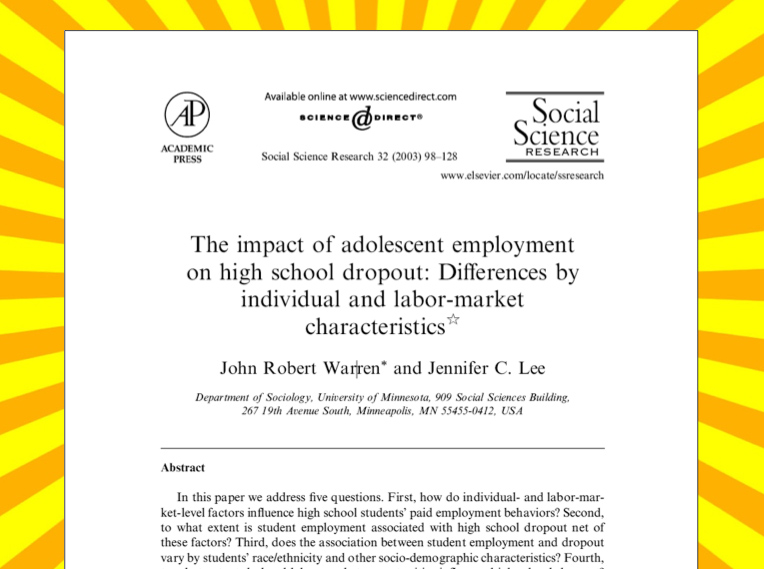Is it possible to study and work part-time?
Yes, you can do it!
But like anything in life, you have to manage yourself. You don’t want to overdo it.
I recently received an email from a year 10 student called Ben. He explained his situation to me:
“I have a demanding part-time job and also have to balance school with that. I average about 10 hours [at work], but it can range from 4 hours to 25 hours each week.
The job is both physically draining as I can be on my feet for 9 hours and mentally draining as the managers put a lot of pressure on me. There is never any downtime on the job.
I was wondering if you had any tips?”
Ben, I’m so glad you asked!
Here are my thoughts on balancing school and paid work . . .
If you’re working 25 hours a week (that’s 3 full days of work plus overtime), it’s going to be challenging to fit in quality study.
Let’s do some simple maths . . .
You have 168 hours in the week.
Time for sleep = 56 hours
Time at school = 30 hours
Time at work = 25 hours
These things add up to 111 hours, which leaves you with 57 hours in the week.
57 hours.
Sounds like a lot, right? Think again.
Don’t forget to add in your commuting time (getting to and from work and school), time to eat, time to shower and get dressed . . . that doesn’t leave you with a lot of time to study and rest. And rest is super important. Everyone needs a rest day.
But what does the research say about juggling work and school?
The research suggests that working a few hours a week is okay. In fact, it can be beneficial. But what if you work 20 or more hours each week?
This study found that students who work more than 20 hours a week are 40% more likely than other students to drop out of high school.
Trust me, you don’t want to drop out of school.
If money is your main motivation for working, then you must finish high school.
Why?
Because by finishing school you dramatically increase your earning capacity.
Studies have found people who don’t finish high school earn a whopping 65-70% less every year than those who do finish high school. 65-70% less!
School may not pay you an hourly wage, but if you finish school and go to university this will pay great dividends later down the track. Studies show that qualified people have higher employment rates and higher incomes.
According to the Australian Bureau of Statistics, in 2016 people with at least a bachelor’s degree earned $600 more each week than those with no qualifications on average.
But what about all those famous drop outs who became millionaires/billionaires (e.g. Steve Jobs and Mark Zuckerberg)?
Most of these famous examples dropped out of university (not high school). And when they did drop out, they weren’t sitting on the couch all day watching Netflix and eating sausage rolls.
All of these famous drop outs had passions and interests that they pursued with intense focus outside of the traditional education system. Often we lose sight of this fact and jump to the conclusion that you can drop out of school and become rich. But it doesn’t work like that.
Ask yourself, “Do I really need the money?”
How much money do you really need? And what are you spending your money on? Are these things making you happier?
I met a year 12 student who was spending $200 a month on dying her hair. It was a source of unnecessary stress. When I asked her what the biggest challenge was in her life, she stated:
“[My biggest challenge is] when my hair colour is not one single colour despite it being a naturally blended blonde from my roots. . . don’t ever dye your hair!”
$200 plus a truckload of stress. Think about that for a moment.
Now think about that in terms of life energy. How much time and energy does it take to make the money ($200) to pay for her hair to be dyed?
For a student on an hourly wage of $15, you’re looking at 13 hours of work (nearly two full days).
You have to ask, “Is it really worth it?”
But it’s not all about the money . . .
Obviously, money is only one factor to consider in all of this.
I know a lot of extremely well educated people who don’t earn a lot of money. This is by choice (they value their time over money so they choose to work less). But having a good education has given these people more options in life. For instance, it’s much easier for people with qualifications to get a job.
Ask any adult who is currently unemployed (and looking for work) what’s it’s like to be out of work. They’ll tell you it’s demoralising.
Being unemployed is very hard financially but it’s almost harder mentally. You begin to doubt yourself. A number of studies (such as this one) have found being unemployed leads to a range of physical and mental health problems. What I’m trying to say is . . .
Qualifications matter. They matter a lot.
Here’s why:
• They give you confidence.
• They give you a sense of power and freedom.
• They act as an independent testimony to your capability.
• They provide you with important connection to others.
So unless you desperately need the money to survive, your first job needs to be school.
How many hours should you work?
During the school term, I recommend that you work 3 hours per week. If you must work more, make it no more than 10 hours per week.
School holidays are a different story. Knock yourself out. Ramp up those hours!
But during the school term, study needs to be your top priority.
How to manage yourself and your time better
If you do decide to get a part-time job, it’s worth spending a little time developing effective study habits and a few simple organisation skills.
Here are some things you can do:
• Squeeze in 10 minutes of study in the morning before school or before you go to work. If someone is driving you to work, do a quick flashcard session or teach a concept you learnt that day to the person who is driving you.
• If you’re working in the afternoon, smash out your homework during recess and/or lunch.
• Make the most of your time in class. Take notes and pay attention (this makes doing your homework a lot easier).
Be firm with your work manager
Managers love young, capable workers. You have energy. Plus you’re cheap to employ. So you have to realise that the more you give, the more they’ll take.
Don’t be afraid to speak up.
When it’s 6-8 weeks out from exams tell your manager that your exams are coming up and you’ll need to cut back on your hours. If your manager values education they should understand and respect your request. And if they don’t? Then it’s time to start looking for another job.
Get connected to your future self
Studying can be boring at times. I get that. It’s easy to think, “How is this going to help me in the future?” There may be moments when you feel like giving up.
In those moments, I recommend using a simple strategy called Mental Contrasting.
Here’s how Dr Barbara Oakley explains the technique in her book A mind for numbers:
“In this technique, you think about where you are now and contrast it with what you want to achieve. If you’re trying to get into medical school, for example, imagine yourself as a doctor, helping others even as you’re preparing for a great vacation that you can actually afford. Once you’ve got that upbeat image in mind, contrast it with images in your current life. Imagine your clunker of a car, your macaroni and cheese dinners, and your mountain of student debts. Yet there’s hope!
In mental contrasting, it’s the contrast of where you want to be with where you are now, or where you have been, that makes the difference.”
I have used this strategy and it works a treat!
For example, when I was a university student, I used to contrast the image of myself working as a public speaker (what I wanted to achieve) with the image of me working on an orchard picking fruit for $10 an hour in the scorching summer heat, surrounded by flies (my job as a student).
This technique made all the difference in those moment when I felt like giving up on my studies!
To sum up
Do you want to work at a greasy fast food joint for the rest of your life? I didn’t think so.
So make sure your first job is school.
Use your part-time job as a source of motivation to get a good education and progress onto bigger and better things. Trust me, your future self will thank you for it.




